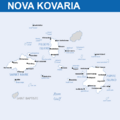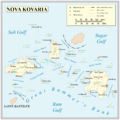Category:Nova Kovaria: Difference between revisions
Ozycaevias (talk | contribs) (Created blank page) |
Ozycaevias (talk | contribs) No edit summary |
||
| (2 intermediate revisions by the same user not shown) | |||
| Line 1: | Line 1: | ||
[[Image:NovaKovaria_Banner.png|center]] | |||
<gallery mode="slideshow" style="width:300px; float:left; margin-right:20px; margin-top:-24px; margin-bottom:-24px;"> | |||
Image:NovaKovaria_Flag.png | |||
Image:NovaKovaria_CoatofArms.png | |||
Image:NK_WikiMap.png | |||
Image:NovaKovaria_DetailedMap.png | |||
</gallery> | |||
{{:Nova Kovaria}} | |||
[[Category:Countries (Levilion)]] | |||
Latest revision as of 07:08, 2 May 2022
Nova Koravia (Tyrnican: Niuwekovår), officially the Republic of Nova Kovaria (Republik Niuwekovår) is an island country located in the Rum Gulf. Its closest neighbor is Saint-Baptiste, with whom it shares the Rum Islands archipelago. It has a population of 6,756,433 people spread across 3 major and numerous minor islands. Its capital is Augusta on Aspire Island and its largest city is Freeport on Sainkt Mark.
Home to native peoples since at least the 1st century, Tyrnican and Rythenean settlers arrived in the early-mid 17th century, haphazardly establishing settlements across the archipelago. Chattel slaves from Idica and indentured servants from Auressia (and, to a lesser extent, Surucia) arrived soon after. These institutions would result in a boom of cash crop and monocultural plantation farming, including sugar, coffee, and fruits. By the late 17th century, almost all of the native population had died from disease or deliberate attacks by the settlers.
Cooperation emerged between the Tyrnican and Rythene populations, forming a distinct Nova Koravian identity. During the Tyrno-Rythenean Wars, the Rythenean controlled islands were taken and the archipelago was reorganized under the single Governor of Nova Kovaria. Tyrnican rule would last until 1854 when the islands were traded to Audonia for a long-term partnership. Turmoil in Aurdonia and unrest in the islands, however, would lead to independence in 1868 as the First Republic of Nova Kovaria. This republic would eventually fall to a coup after Audonian intervention in 1882, and then again in 1890, before being restored during the August Revolution in 1921.
Nova Kovaria is a developed nation and has a broad manufacturing sector, including high-tech, petrochemical, pharmaceutical, and industrial machinery industries. It also retains robust financial and service sectors, as well as an emerging spaceflight industry. Tourism is also a large industry, though it is highly localized and often not the focus of the nation. For the most part, agriculture has been superseded by manufacturing, and much of the islands’ food is imported. A lack of other natural resources has created a deficit to import the raw materials and basic goods needed for Nova Kovaria’s manufacturing. Fossil fuels importation, especially, are a significant portion of its international trade, despite having plentiful offshore deposits.
Pages in category "Nova Kovaria"
The following 4 pages are in this category, out of 4 total.




